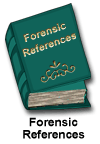|
|
 |
Unit.D.4.5.
Addictions Assessment/ Treatment
The
required readings for this unit are:
 Australia
Australia |
Required
Reading(s)
|
 |
Insert article here
 Canada
Canada |
Required
Reading(s)
|
 |
Insert article here
 International
International |
Required
Reading(s)
|
 |
Insert article here
 United Kingdom
United Kingdom |
Required
Reading(s)
|
 |
|
Isherwood,
S., & Brooke, D. (2002). Prevalence and
|
severity
of substance misuse among referrals to a local forensic
service. Journal of Forensic Psychiatry, 12(2),
446-454. Retrieved December 20, 2002, from Academic
Search Premier database: http://search.epnet.com/direct.asp?an=5180672&db=aph
- Substance
misuse is frequently present alongside mental illness
and personality disorder,
complicating all aspects of management.
- "Substance
misuse is frequently present alongside mental illness
and personality disorder, complicating all aspects
of management. We describe self-reported levels
of substance misuse in referrals to a forensic
psychiatry service, to establish degrees of
dependencyand co-morbidity with other diagnostic
categories and to report the implications for treatment.
There were 146 (70%) of 209 consecutive referrals
who completed a semi-structured questionnaire, including
the Alcohol Use Disorders Identification Test (AUDIT),
Severity of Alcohol Dependency Questionnaire (SADQ),
Alcohol Problem Questionnaire (APQ) and, for frequent
users of opiates or stimulants, the Severity of
Dependence Scales (SDS). Psychiatric diagnoses were
made from clinical assessment using the International
Classification of Diseases (World Health Organization,
1992). ICD-10 diagnoses of substance misuse were
found in 83 (57%) subjects. A combination of mental
illness and a substance misuse diagnosis was found
in 54 (37%). The subgroup accepted into forensic
psychiatric services was found to have higher levels
of co-morbidity, although levels of dependency were
low. Forensic services need expertise in
assessing drug related
morbidity; in motivational interviewing and other
techniques for encouraging change; and in consolidating
recovery" (Isherwood & Brooke, 2002, p.
446).
|
 United States
United States |
Required
Reading(s)
|
 |
Insert article here
Databases
For the full text article online,
sleuth the 'University
of Calgary/ Library/ Article Indexes':
Directions:
- Select
- Indexes and abstracts with links to full text articles
- Select
- Academic Search Premier or Expanded Academic ASAP
- Select
- Connect
-
Fill in
User ID and Pin
- Fill
in search words:
addictions and offender and
Top of Page
|
 |
 |
Unit.D.4.5.
Addictions Assessment/ Treatment
The
'recommended only' readings for this unit are the following:
 Australia
Australia |
Recommended
Reading(s)
|
 |
Insert article/book/chapter here
 Canada
Canada |
Recommended
Reading(s)
|
 |
Insert article/book/chapter here
 International
International |
Recommended
Reading(s)
|
 |
Insert article/book/chapter here
 United Kingdom
United Kingdom |
Recommended
Reading(s)
|
 |
Insert article/book/chapter here
 United States
United States |
Recommended
Reading(s)
|
 |
|
Hardy, D.W., Patel, P., & Paull, D. (2000). Basic
law for
|
addiction
psychiatry. Psychiatric Annals,
30(9), 574-584. Retrieved July 31, 2002, from
ProQuest database.
- Note:
As the practice of addiction psychiatry becomes
increasingly involved in the treatment of court-mandated
patients, it is important for addiction psychiatrists
to familiarize themselves with the law to appreciate
how they can use it to their patients' benefit.
-
"Psychiatry
and the law are irreversibly entwined. As the
practice of addiction psychiatry becomes increasingly
involved in the treatment of court-mandated patients,
it is important for addiction psychiatrists to
familiarize themselves with the law to appreciate
how they can use it to their patients' benefit.
We suggest that addiction psychiatrists can profit
from the forensic psychiatry model, where court-mandated
treatment of involuntary patients is the standard
and is usually successful. We suggest that drug
courts, bringing together clinical and legal professionals
in the most integrated approach to addiction treatment
yet attempted, offer a promising mechanism for
the successful treatment of the most difficult
of these patients" (Hardy, Patel, &
Paull, 2000, p. 574).
|
| Miller,
N. S. (2001). Addictions and the law. |
PsychiatricAnnals,
30(9), 609-623. Retrieved July 31, 2002, from
ProQuest database.
- Note:
Addictions and the law are interwoven in court cases,
legislative actions, constitutional law, and administrative
policy. In general, the law views alcohol and drug
addiction as an illness in an individual who bears
responsibility for its consequences, including punishment
and therapeutic treatments.
- "The
individual is not completely guilty or absolved
from criminal or civil responsibilities because
of addictive disease. Increasingly, alcohol and
drug disorders are considered the root causes of
criminal and civil violations that can be ameliorated
or eliminated through therapeutic actions sanctioned
and monitored by the courts" (Miller, 2001,
p. 609).
- "The
forensic psychiatrist and the generalist should
acquaint themselves with the efficacy of addictions
treatment and the importance and advantages of identifying
addictive diseases in their patients. They must
also consider the legal consequences for not informing
patients of the treatment options for their addictions"
(Miller, 2001, p. 609).
- "The
Rehabilitation Act of 1973 and the Americans with
Disabilities Act of 1990 have provided broad protection
for individuals with physical and mental impairments.
These acts provide precedent for inclusion of alcohol
and drug addiction as a disability. An employee
with an alcohol problem, drug problem, or both (which
can apply to illegal drugs if in treatment and not
using them) can be offered accommodation in the
form of addiction treatment before losing his or
her employment. An alcoholic is entitled to the
option of addiction treatment to perform the essential
functions of a particular job. An alcoholic who
refuses treatment can be terminated from his or
her position, especially if unable to perform his
or her functions due to continued alcohol use. However,
court decisions have made some distinctions as to
how these acts can be applied to individual cases.70-77"
(Miller, 2001, p. 609).
|
Top of Page
|

|
Additional
references for this unit can be found in 'forensic
references'
of the forensic sourcebooks.
- Sleuth
'forensic reference' database for:
addiction - offender
Top of Page
|

|
Video's
recommended for this unit are:
|
|
Resources
(Video)
|
 |
Insert video
here
Top of Page
|

|
Unit.D.4.5.
Addictions Assessment/ Treatment
The
required websites to sleuth for this unit are the following:
 Australia
Australia |
Resources
(Web)
|
 |
Insert website here
 Canada
Canada |
Resources
(Web)
|
 |
 International
International |
Resources
(Web)
|
 |
 United Kingdom
United Kingdom |
Resources
(Web)
|
 |
Insert website here
 United States
United States
|
Resources
(Web)
|
 |
Top of Page
|
 |
For
additional websites on this unit, sleuth 'forensic
websites' in the forensic sourcebooks.
Top of Page
|
 |
|